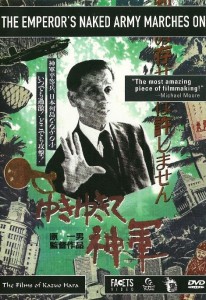
The Organ is a drama set in the times of the wartime Slovak State. A young Polish deserter and gifted organist finds shelter from the fascists in a Slovak Franciscan monastery. He gets into a conflict with the local organist and choir leader, a man limited in his world views and spiritual values. The collision of talent and beauty with pettiness and closed-mindedness leads to envy and ill will, which draw young Felix away from his temporary hiding place and back to the dangers of war.
Read More »
The Great Profile (1940) Walter Lang, John Barrymore, Mary Beth Hughes, Gregory Ratoff, Comedy

Barrymore lampoons himself. A famous actor, given to drink, nearly destroys the show, but his leading lady returns to save it. Meanwhile a young girl tries to reform him.
Read More »
Night Song (1947) John Cromwell, Dana Andrews, Merle Oberon, Ethel Barrymore, Drama, Romance, Music

Cathy Mallory, beautiful socialite who prefers classical music, is taken by friends to a back-alley dance club. There, she meets blind pianist Dan Evans, who plays in Chick Morgan’s swing band but seems to be a composer of great promise. Attracted but spurned, Cathy feigns blindness herself to get past Dan’s bitter facade, scheming to get him to the doctor who can restore his sight…and to Carnegie Hall. But her actions bring about several twists in their relationship…
Read More »
Smejdi / Crooks (2013) Silvie Dymáková, Roman Vanek, Ondrej Vetchý, Documentary

Silvie Dymáková’s raw documentary uncovers the manipulation, humiliation and pressure that exist behind the closed doors of “product demonstration excursions for seniors” in the Czech Republic. The sad heroes of her film show us the non-functional saucepans, unused vacuum cleaners, “wool” blankets and bio-lamps they bought during such excursions for tens or even hundreds of thousands of crowns… and that is the best-case scenario. In exchange for their ID cards, confiscated by sellers, many have signed loan contracts. Despite their shocking experiences, the elderly repeatedly take part in these events in a bid to escape their loneliness or because they can’t say no to the offers. Dymáková succeeded in smuggling a hidden camera into product presentations and, with a psychologist and a lawyer, analyzed the high-pressure methods employed. Even while being completed, her documentary sparked a deserved uproar when it became clear that dozens of Czech firms were abusing seniors’ …
Read More »
Panic Button (1964) George Sherman, Giuliano Carnimeo, Maurice Chevalier, Eleanor Parker, Jayne Mansfield, Comedy

A businessman plans to solve his tax problems by financing a film version of “Romeo and Juliet”. He hires Maurice Chevalier and Jayne Mansfield to play the title roles, and Akim Tamiroff to direct. The finished film is shown at the Venice Film Festival, where it’s considered a witty parody and awarded a Golden Lion.
Read More »
Voice of the Whistler (1945) William Castle, Richard Dix, Lynn Merrick, Rhys Williams, Drama, Film-Noir

The 4th film of the Columbia series based on the CBS radio program, “The Whistler”, finds wealthy John Sinclair, with no health or friends, being advised by his doctor to take a long vacation. Heading for the Great Lakes, he becomes ill in the cab operated by Ernie Sparrow an is taken to a clinic where he meets nurse Joan Martin, who is engaged to intern Fred Graham. Doctors now tell him he has only a few months to live and advise him to go to Maine (where, evidently, it will seem longer.) He asks Joan to marry him, promising to leave her his fortune.
Read More »
Appassionata / Passionate (1974) Gianluigi Calderone, Gabriele Ferzetti, Ornella Muti, Eleonora Giorgi, Drama, Erotic

Two teenage friends conspire to find out how much their youthful sensuality can disrupt one of their households, headed by a dentist and his mentally-ill wife.
Read More »
Bad Men of the Border (1945) Wallace Fox, Kirby Grant, Fuzzy Knight, Armida, Music, Romance, Western

U. S. Marshal Ted Cameron (Kirby Grant), masquerading as a bandit, robs a mail coach. Delores Mendoza (Armida), a passenger, is an agent for the Mexican government, assigned to investigate a counterfeiting and smuggling gang operating below the border. She joins forces with Ted and his sidekick, Rockabye Jones (Fuzzy Knight), and together they expose the gang and bring them to justice.
Read More »
Yuki Yukite shingun / The Emperor’s Naked Army Marches On (1987) Kazuo Hara, Kenzo Okuzaki, Riichi Aikawa, Masaichi Hamaguchi, Documentary, War

The Emperor’s Naked Army Marches On is a brilliant exploration of memory and war guilt, a subject often ignored in modern Japan. In this controversial documentary, Kazuo Hara follows Kenzo Okuzaki in his real-life struggle against Emperor Hirohito. He proudly declares that he shot BBs at the Royal Palace, distributed pornographic images of the Emperor, and once killed a man for the sake of his strange crusade. As the film progresses, Okuzaki reveals a gruesome mystery: why were some Japanese officers killing their own soldiers during WWII? What happened to their bodies? Okuzaki begs, cajoles, and occasionally beats the story out of elderly veterans. When these old men do break down and talk, their testimonies are some of the most chilling, riveting descriptions of wartime desperation ever committed to film. In his desire to unearth these horrors, Okuzaki’s behavior grows increasingly extreme and bizarre. By the film’s end, Hara seems to ask whether the terrible nature of this buried incident is worth the violence of Okuzaki’s methods.
Read More »
Fear Is the Key (1972) Michael Tuchner, Barry Newman, Suzy Kendall, John Vernon, Action, Crime, Drama

Following the death of his family in an aeroplane crash, a man plots an elaborate revenge scheme on those responsible. By setting himself up as a criminal, he plans to get close to a certain tycoon who has been approached by the culprits to help them retrieve the cargo of the lost plane.
Read More »